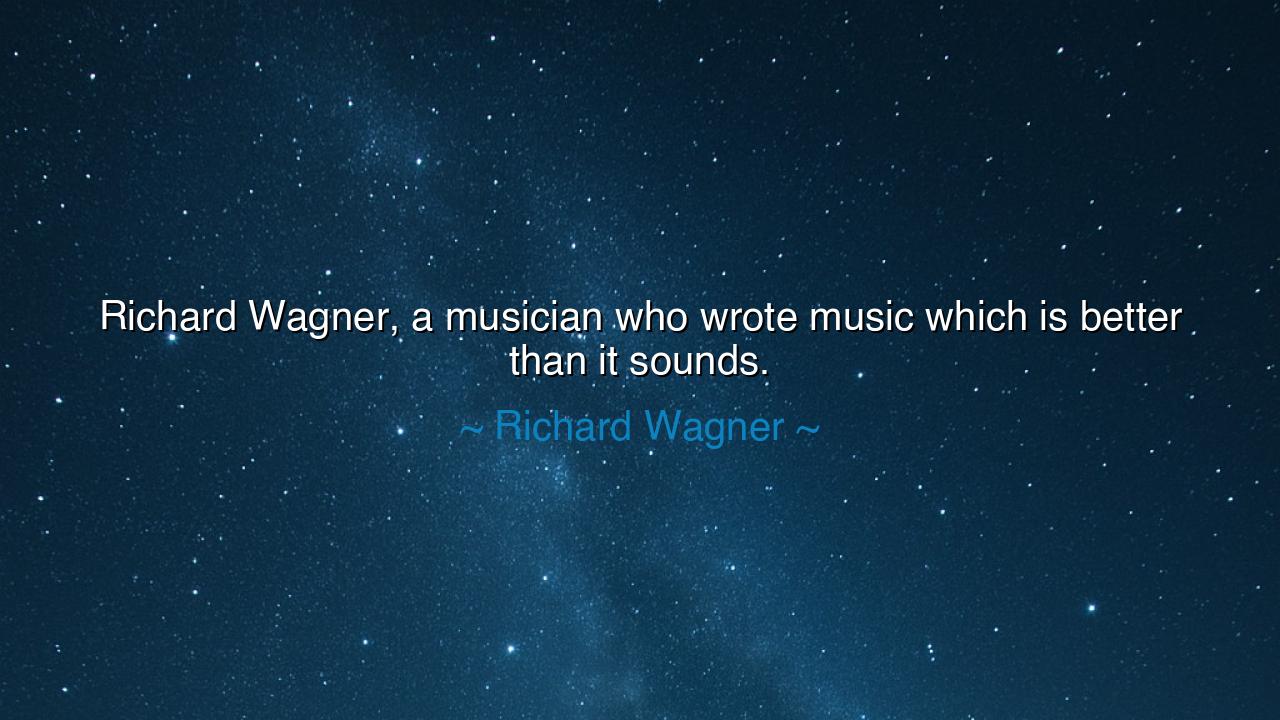
Richard Wagner, a musician who wrote music which is better than






“Richard Wagner, a musician who wrote music which is better than it sounds.” This strange and paradoxical saying, attributed to Wagner himself, carries within it a truth that is both playful and profound. For Wagner was no ordinary composer; he was a visionary who sought to transform music into a total experience of the spirit. When he declares that his music is “better than it sounds,” he is not dismissing his own creations, but rather pointing us toward a hidden meaning: that music can contain a depth, an architecture, a vision greater than what the ear first perceives. His works were vast cathedrals of sound, and sometimes the casual listener, unprepared, might find them overwhelming or even difficult. Yet within them lay a power beyond the surface—a greatness that demanded patience, reflection, and a heart willing to climb to its heights.
The ancients often taught that truth is veiled. A temple may appear to be only stone and shadow until the seeker steps inside, where sacred fire burns at the altar. So it was with Wagner’s compositions. To the hurried ear, they might sound long, dense, even unfriendly. But to the one who lingers, who listens with soul as well as ear, an entire universe unfolds—heroes and gods, love and betrayal, the rise and fall of kingdoms. Thus, when Wagner speaks of his music being “better than it sounds,” he reminds us that appearances are shallow, and that the essence of creation lies in its depth, not in its surface.
Consider the unveiling of his monumental Ring Cycle in Bayreuth. Many who first attended were bewildered: four operas, performed over days, filled with leitmotifs weaving themes so subtle that only through repeated hearing could their full design be understood. Critics scoffed, some walked away impatient, and yet the faithful returned. Over time, those who gave themselves to Wagner’s vision discovered that he had not merely written notes, but carved a mythic world into sound. His “music” was more than harmony—it was philosophy, poetry, architecture, and myth interwoven. It was indeed “better than it sounds,” for its true greatness was grasped not in a single hearing, but in the transformation it left upon the soul.
History offers other mirrors to this truth. Think of the great cathedrals of Europe. To the passerby, they may seem only like heavy stone walls. But step within, and the soaring vaults, the play of light through stained glass, reveal the touch of the divine. The casual eye may see stone, but the prepared heart beholds heaven. In the same way, Wagner’s music challenges us to go beyond mere hearing, to enter into the temple of sound he constructed, and there to be changed.
The wisdom of this quote extends beyond music. Many things in life are “better than they sound.” Wisdom itself often comes wrapped in simplicity: “Know thyself,” or “Do unto others as you would have them do unto you.” At first, such words seem small, even plain. Yet when lived, they unfold into oceans of truth. So too with people—how often do we dismiss a voice because it does not please the ear, only to find later that behind it lies courage, genius, or compassion? Wagner’s words remind us to look deeper, to listen not just with ears but with soul.
The lesson is clear: do not be deceived by surface impressions. What is awkward at first may contain the seeds of greatness. When confronted with art, with wisdom, or with people, linger a little longer. Ask: “What lies beyond the sound, beyond the appearance, beyond my first judgment?” You may discover treasures hidden from the impatient.
Practically, this means cultivating the discipline of deep listening. When you hear music that confuses you, resist the urge to dismiss it; instead, return, listen again, and let it unfold. When you meet someone whose manner is strange, do not turn away, but look for the soul beneath. When you encounter words of wisdom that seem simple, reflect upon them until their deeper roots are revealed. By doing so, you train your spirit to see beyond the veil of appearances.
Thus, let Wagner’s paradox be a guiding star: the greatest things in life may not dazzle us at first glance, but their glory is revealed to those who persevere. Music, truth, and the human spirit all contain depths far beyond their surface. Seek those depths, and you will find that life itself is always “better than it sounds.”






AAdministratorAdministrator
Welcome, honored guests. Please leave a comment, we will respond soon